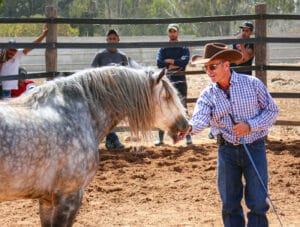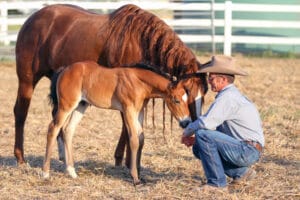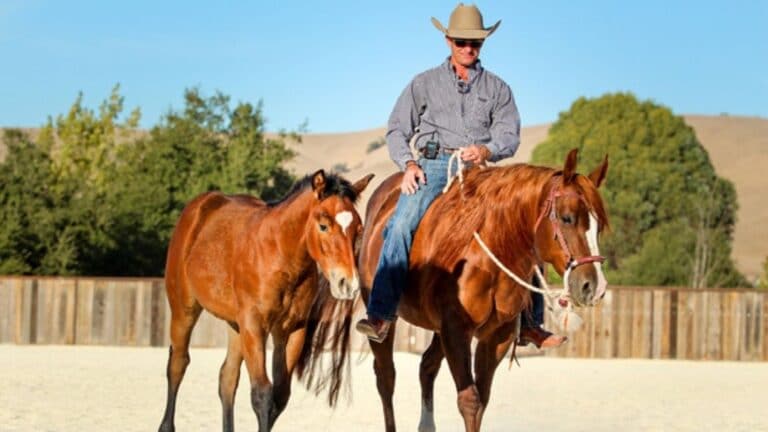A lifelong equestrian in a variety of disciplines, Warwick was in his twenties when, in order to pursue his dream of training horses, he moved from his home in Australia to the United States.
Warwick Schiller has been training horses professionally in the US since 1990. Initially his passion was reining, which led to him representing Australia twice at the World Equestrian Games: in Lexington, Kentucky in 2010, and Tryon, North Carolina in 2018. Along the way, he discovered not only a passion for teaching, but also that explaining concepts to people in a way they could understand came naturally to him.

His horse training journey has run parallel to his own journey into healing, self-development and personal growth. He has always been a student of the horse, and continues to learn as much as he can from many different sources and disciplines. But a number of years ago he encountered a horse that was not helped by the techniques he was using at the time. This led him on a deep dive into approaches that were outside the norms of current mainstream training, methods based on the concepts of connection and relationship. The more he learned about the horse’s nervous system and how it is affected by trauma, the more he looked into his own life story – and the two have been leap-frogging each other ever since.
Warwick’s YouTube channel, which he started in 2011, currently has over 25 million views and counting. During COVID in 2020 he started The Journey on Podcast, in which he shares not only horse training ideas, but also his own story of transformational growth in both his personal life and his career as a horse trainer, as well as interviews with interesting guests from all walks of life who share their own life-altering stories, motivations and influences. The Journey on Podcast has had one and a half million downloads in its first two years.
Warwick also maintains an extensive online video library with over 800 real time training videos, designed to help members create a relaxed, connected and skilled equine partner.
Q: What was your dream or what were your goals when you first set your sights on the equestrian industry?
I’ve never had a lot of self-confidence, and consequently didn’t really ‘set my sights’ on a career in the equestrian industry, as I thought that that was only was for ‘the talented people’. In 1990 I came to the US for a year. During that time I wanted to find a job with a trainer and learn a bit about training reining horses so I could train my own horses back in Australia. I found a job within two weeks and at the end of the year the trainer said: “If you want to come back, I’ll give you a job. You could do this for a living if you wanted to.” It all just grew from there.
Q: We believe in the great value of mentors, did you or do you have a mentor that has made a significant impact in your life or career?
No, but I wish I had. Looking back now, I realise that I wasn’t open to being vulnerable enough to invite a mentor in.
Q: What is the best advice you were ever given?
As far as the reining goes: ‘You win or you lose the day you buy the horse’. It’s such a difficult sport to master that if you don’t have the right type of horse you will be struggling all the way. When it comes to horses in general: ‘They know when you know and they know when you don’t’ pretty much tops the list. I wasn’t given that advice directly, I read it – and as I’ve come to understand the deeper meanings of it, it has become more and more profound.
Q: What roadblock or roadblocks have you overcome to be where you are today professionally?
I no longer train or show reining horses, but the last time I competed was at the World Equestrian Games in 2018. I hadn’t been competing for a few years before that, and felt I was physically rusty. I had a personal best score in the qualifying round and then beat that by three points in the semi-finals. It was strange because even though I wasn’t physically as good as I’d once been, I’d done a lot of mental work on myself, both in personal development and sports psychology, and it made a huge difference. Looking back now, there were mental roadblocks I’d always battled with without even knowing they were there.


